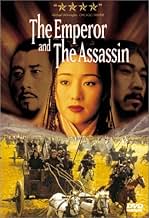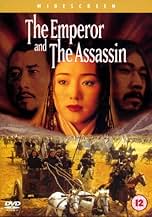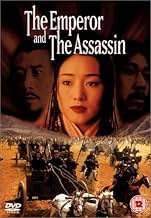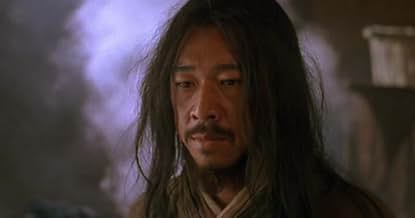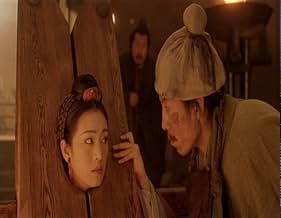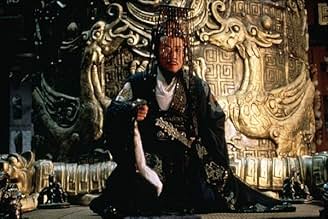AVALIAÇÃO DA IMDb
7,2/10
6,6 mil
SUA AVALIAÇÃO
Adicionar um enredo no seu idiomaIn pre-unified China, the King of Qin sends his concubine to a rival kingdom to produce an assassin for a political plot, but as the king's cruelty mounts she finds her loyalty faltering.In pre-unified China, the King of Qin sends his concubine to a rival kingdom to produce an assassin for a political plot, but as the king's cruelty mounts she finds her loyalty faltering.In pre-unified China, the King of Qin sends his concubine to a rival kingdom to produce an assassin for a political plot, but as the king's cruelty mounts she finds her loyalty faltering.
- Direção
- Roteiristas
- Artistas
- Prêmios
- 7 vitórias e 11 indicações no total
- Direção
- Roteiristas
- Elenco e equipe completos
- Produção, bilheteria e muito mais no IMDbPro
Avaliações em destaque
This is an epic film about the unification of the ancient kingdoms of China in the third century BC. What makes it interesting is the tragic downfall of the king and all the palace intrigue going on around him. It reminded me a bit of "King Lear" and some of the other Shakespeare plays.
The king starts out with noble ambitions, to unify the kingdoms under one ruler and to stop all the quarrelling so that the people can prosper and lead better lives. He and his childhood sweetheart, played beautifully by Li Gong, concoct a scheme whereby she pretends to go into exile in a rival kingdom in order to recruit an assassin to kill the king, thus giving him a pretext to go to war. But while she's away, the king becomes sadistic in his lust for power and goes on a killing spree.
There are numerous side plots that keep the action going. There is the Marquis, who pretends to be stupid and foppish but who's really very clever and wants to become king himself. He fathers two children with the king's mother and manages to keep it secret for years. Then there is the Prime Minister, a political rival to the king, who turns out to really be his father.
The assassin is a complex character himself. An adept swordsman and killer, he is undergoing a reformation when the king's lover comes to recruit him. He wants nothing more with killing, but is eventually won over by Li Gong (who wouldn't be?) when he sees how cruel and vicious the king has become.
Some spectacular cinematography, especially the battle scenes that are carried out on a grand scale - like they used to say, a cast of thousands, literally. The acting is OK, nothing special. It's the story that's interesting, though at over two and a half hours, it pushes the limit.
Definitely worth viewing.
The king starts out with noble ambitions, to unify the kingdoms under one ruler and to stop all the quarrelling so that the people can prosper and lead better lives. He and his childhood sweetheart, played beautifully by Li Gong, concoct a scheme whereby she pretends to go into exile in a rival kingdom in order to recruit an assassin to kill the king, thus giving him a pretext to go to war. But while she's away, the king becomes sadistic in his lust for power and goes on a killing spree.
There are numerous side plots that keep the action going. There is the Marquis, who pretends to be stupid and foppish but who's really very clever and wants to become king himself. He fathers two children with the king's mother and manages to keep it secret for years. Then there is the Prime Minister, a political rival to the king, who turns out to really be his father.
The assassin is a complex character himself. An adept swordsman and killer, he is undergoing a reformation when the king's lover comes to recruit him. He wants nothing more with killing, but is eventually won over by Li Gong (who wouldn't be?) when he sees how cruel and vicious the king has become.
Some spectacular cinematography, especially the battle scenes that are carried out on a grand scale - like they used to say, a cast of thousands, literally. The acting is OK, nothing special. It's the story that's interesting, though at over two and a half hours, it pushes the limit.
Definitely worth viewing.
10Anth-8
After watching the movie a few times, I found so many subtle touches and emotions within the dialogue. Jing Ke, the Assassin has become one of favorite movie characters of all time. This fine Chinese actor says more with his eyes and his economy of words and movements then any big screen American actor today. Qin, the Emperor, is brilliant as he leads the audience to believe the kindness in his heart, only to unleash the most cruel acts upon the people around him. The promises he makes with incredible passion and shattered with an evil fist. Gong Li, as in just about every movie I've ever seen her in, is simply fantastic. Her screen dominance is so graceful and emotionally charged.
In case you couldn't tell, I loved this movie.
In case you couldn't tell, I loved this movie.
10oaksong
I've read some grumbles about the court scenes. These people betray their ignorance. This production went to simply amazing lengths to recreate all aspects of the period in which the story occurred. Courtly manners are something few people outside the court ever see. While the acting may appear highly stylized, it is, in fact, as close a replication as possible of the behavior of individuals in their particular stations as the director could create. The actor's facial expressions are a marvel, particularly the duplicitous Marquis Changxin and the King's mother.
There are, of course, reflections of both Greek and Shakespearian tragedy in the relationship between the king, his parents and his love. The juxtaposition of the king transforming from good to bad and the assassin from bad to good provides much food for thought on the evolution of an individual's nature. This movie would provide much to ponder in a college course on the humanities.
At the same time, it almost rushes along, even in the slowest scenes heading towards an inexorable denouement. One suspects the involvement of large portions of the troop movements, which were quite awesome. It makes The Lord of the Rings battle scenes pale by comparison. Few directors have the ability to literally field thousands of humans on the field of battle just for art's sake. I recall one scene in which at least 30,000 troops can be seen moving across a huge plain. The logistics for such a shot would have been staggering.
I could go on... but simply, I can't recommend this film highly enough.
There are, of course, reflections of both Greek and Shakespearian tragedy in the relationship between the king, his parents and his love. The juxtaposition of the king transforming from good to bad and the assassin from bad to good provides much food for thought on the evolution of an individual's nature. This movie would provide much to ponder in a college course on the humanities.
At the same time, it almost rushes along, even in the slowest scenes heading towards an inexorable denouement. One suspects the involvement of large portions of the troop movements, which were quite awesome. It makes The Lord of the Rings battle scenes pale by comparison. Few directors have the ability to literally field thousands of humans on the field of battle just for art's sake. I recall one scene in which at least 30,000 troops can be seen moving across a huge plain. The logistics for such a shot would have been staggering.
I could go on... but simply, I can't recommend this film highly enough.
Chen Kiage (Farewell My Concubine) and Zhang Yimou (Red Sorghum, To Live) have been always considered two of the greatest director of modern China cinema history. This time Chen took three years after his previous film and came back with a movie about the first Chinese emperor Qin and his legendary story with a woman he loves, his adversary and an assassin in very ancient China of 221 BC. Assassin Jingke stab emperor Qin is a well know story that nearly every Chinese know it so well. Assassin Jingke was considered a biggest hero in the history for his great sacrifice spirit and the brave suicide assassination, although his action was failed. Zhang Fengyi is one of my favorite actor (I like his performance in Farewell my concubine), his assassin Jinke is silent and full of passion in the heart, that is convincing. Li Xuejian is honorable actor but just miscast here, His King Qin is always with tears in his eyes and feels miserable. I can not understand why Chen decides to make this most tyranny emperor in the Chinese history always crying. The most attractive role in the movie is Marquis Changxin, he married Qin's mother and most time he looks like idiot but actually he has his own ambitious plan. Marquis Changxin is convincingly played by Wang Zhiwen, I like him so much.
The movie do have some memorable moments, one is Jingke took a assignment to kill the whole family of ironsmith, but when he facing the angelic blind daughter of ironsmith, he cannot do his job. Late, the daughter killed herself. That event had a biggest influence for the rest of Jingke's life, also a big impact for the audience.
The movie has some most popular Chinese comedian (Pan Changjiang for prison officer and Zhao Benshan for Gao Jianli) for the friendly cameo, when they appears in the screen, audience shout and smiled. This would not happened when this movie is showed in country outside China.
I don't know if it is the biggest budget film in China, but it is surely one of them. They built Qin's palace especially for this movie and now becomes a tourist sight. It is near my city. I didn't go there but my father did. He said it is great building.
Overall, this is the excellent movie for the people like ancient Chinese costume and culture. The photography is very beautiful. Compared to the greatest "Farewell My Concubine", Chen does not make it reach that level. I give it *** for the rate from * to ****.
The movie do have some memorable moments, one is Jingke took a assignment to kill the whole family of ironsmith, but when he facing the angelic blind daughter of ironsmith, he cannot do his job. Late, the daughter killed herself. That event had a biggest influence for the rest of Jingke's life, also a big impact for the audience.
The movie has some most popular Chinese comedian (Pan Changjiang for prison officer and Zhao Benshan for Gao Jianli) for the friendly cameo, when they appears in the screen, audience shout and smiled. This would not happened when this movie is showed in country outside China.
I don't know if it is the biggest budget film in China, but it is surely one of them. They built Qin's palace especially for this movie and now becomes a tourist sight. It is near my city. I didn't go there but my father did. He said it is great building.
Overall, this is the excellent movie for the people like ancient Chinese costume and culture. The photography is very beautiful. Compared to the greatest "Farewell My Concubine", Chen does not make it reach that level. I give it *** for the rate from * to ****.
I will admit my ignorance of this film's existence, until I saw it advertised on a cable outlet. I was very impressed with the novelistic structure of the film. The film, which is in a language I do not understand, shone with intelligence and nuance for me. I think this speaks to the film's quality. It was visually stunning. The acting was visually entrancing. The Chinese theater traditions of movement, used to enhance the delivery of dialogue, is so compelling after watching Western film, where actors traditionally focus more heavily on the dialogue. The action in this film comes right at you, without a lot of explosions to get your attention. It is human action that is so affective here. The added advantage that the film taught me history about one of the world's greatest tourist attractions, the funereal clay army of China's First Qin Emporer, was very impressive. It seemed to give the film an international relevance beyond the film's great ethical themes. This is a film I can comfortably recommend to a wide variety of friends and acquaintances.
Você sabia?
- CuriosidadesThe Xianyang palace was reconstructed in its entirety in the city of Dongyang in Zhenjiang province. Much of the film, including the final scene, was shot there. It is now being preserved as a theme park drawing large numbers of tourists. In addition, the capital cities of the other kingdoms featured in the film, Yan Zhao and Han, were constructed as several sights across China. All have been meticulously built to scale with special attention paid to their historical accuracy.
- Versões alternativasFirst cut was deemed regime-critic by chinese censors and therefore rejected. Approximately 30 minutes were cut to make a more regime-friendly version.
Principais escolhas
Faça login para avaliar e ver a lista de recomendações personalizadas
- How long is The Emperor and the Assassin?Fornecido pela Alexa
Detalhes
- Data de lançamento
- Países de origem
- Centrais de atendimento oficiais
- Idioma
- Também conhecido como
- The Emperor and the Assassin
- Empresas de produção
- Consulte mais créditos da empresa na IMDbPro
Bilheteria
- Orçamento
- US$ 15.000.000 (estimativa)
- Faturamento bruto nos EUA e Canadá
- US$ 1.267.239
- Fim de semana de estreia nos EUA e Canadá
- US$ 47.295
- 19 de dez. de 1999
- Faturamento bruto mundial
- US$ 1.267.239
- Tempo de duração2 horas 42 minutos
- Cor
- Mixagem de som
- Proporção
- 1.85 : 1
Contribua para esta página
Sugerir uma alteração ou adicionar conteúdo ausente

Principal brecha
By what name was O Imperador e o Assassino (1998) officially released in India in English?
Responda

